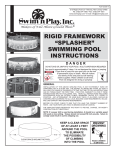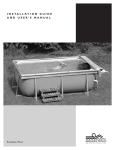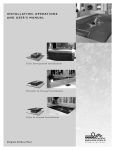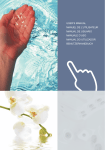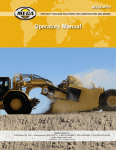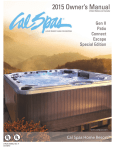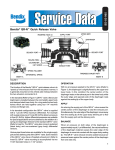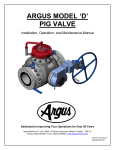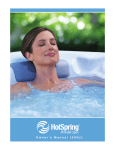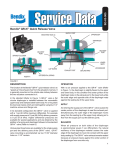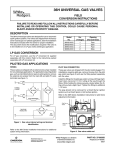Download durst 814 transfer case service manual
Transcript
SERVICE MANUAL DURST MODEL 814-TRANSFER CASE Phone: 608-365-2563 DO NOT Revise this, see Teamwork Fax: 608-365-2182 1 TABLE OF CONTENTS WARNINGS AND CAUTIONS . . . . . . . . . . . . . . . . . . . . . . . . . . . . . . . . . . . . . . . . . . . . . . . . . . . …… 3 MODEL IDENTIFICATION . . . . . . . . . . . . . . . . . . . . . . . . . . . . . . . . . . . . . . . . . . . . . . ……... 4 INSTALLATION INSTRUCTIONS . . . . . . . . . . . . . . . . . . . . . . . . . . . . . . . . . . . . . . . . . . . . . ………. 6 REPAIR AND REBUILDING INSTRUCTIONS Disassembly Instructions . . . . . . . . . . . . . . . . . . . . . . . . . . . . . . . . . . . . . . . . . . . . . . . . . . . . . …… 7 Cleaning and Inspection instructions . . . . . . . . . . . . . . . . . . . . . . . . . . . . . . . . . . . . . . . . . . . . . …. 8 Reassembly Instructions . . . . . . . . . . . . . . . . . . . . . . . . . . . . . . . . . . . . . . . . . . . . . . . . . . . . . …… 9-12 PREVENTATIVE MAINTENANCE. . . . . . . . . . . . . . . . . . . . . . . . . . . . . . . . . . . . . . . . . . . . . . . . …… 14 GENERAL INFORMATION Tools Needed . . . . . . . . . . . . . . . . . . . . . . . . . . . . . . . . . . . . . . . . . . . . . . . . . . . . . . . . . . . . . . …... 15 Definitions . . . . . . . . . . . . . . . . . . . . . . . . . . . . . . . . . . . . . . . . . . . . . . . . . . . . . . . . . . . . . . .. ……. 15 Tables . . . . . . . . . . . . . . . . . . . . . . . . . . . . . . . . . . . . . . . . . . . . . . . . . . . . . . . . . . . . . . . . . . . …… 15 WARRANTY . . . . . . . . . . . . . . . . . . . . . . . . . . . . . . . . . . . . . . . . . . . . . . . . . . . . . . . . . . . . .. . . . . . . . 16 Phone: 608-365-2563 DO NOT Revise this, see Teamwork Fax: 608-365-2182 2 IMPORTANT INFORMATION Please Read Carefully Upon receipt of product, immediately inspect for any indication of rough handling or damage in transit. This includes but is not limited to: scuffed paint, broken or damaged containers, broken or cracked housings, bent shafts, metal deformation, or shift in alignment of components. Read ALL instructions prior to operating transfer case. Injury to personnel or transfer case failure may be caused by improper installation, maintenance or operation. • • • • • • • • Written authorization from REGAL-BELOIT CORPORATION or its divisions/subsidiaries is required to operate or use transfer case in man lift or people moving devices. Buyer shall be solely responsible for determining the adequacy of the product for any and all uses to which Buyer shall apply the product. The application by Buyer shall not be subject to any implied warranty of fitness for particular purpose. For safety, Buyer or user should provide protective guards over all shaft extensions and any moving apparatus mounted thereon. The user is responsible for checking all applicable safety codes in their area and providing suitable guards. Failure to do so may result in bodily injury and/or damage to equipment. Hot oil can cause severe burns. Use extreme care when removing lubrication plugs and vents. Make certain that the power supply is disconnected before attempting to service or remove any components. Lockout the power supply and tag it to prevent unexpected application of power. TORSIONAL VIBRATIONS, emanating from many modern diesel engines, can cause severe damage to power train components, resulting in premature failure. To insure the integrity of the power transmission system, a torsional vibration analysis should be performed and suitable vibration dampening components utilized, when indicated by the analysis. Durst is not responsible for damage or failure resulting from diesel engine generated torsional vibrations. Lifting supports including eyebolts are to be used for vertically lifting the gearbox only and no other associated attachments or motors. If the transfer case cannot be located in a clear and dry area with access to adequate cooling air supply, precautions must be taken to avoid the ingestion of contaminates such as water, and the reduction in cooling ability due to exterior contaminates . Mounting bolts should be routinely checked to ensure that the unit is firmly anchored for proper operation. Refer to page 15 for proper torque specifications when tightening bolts. In the event of the resale of any of the goods, in whatever form, Resellers/Buyers will include the following language in a conspicuous place and in a conspicuous manner in a written agreement covering such sale: The manufacturer makes no warranties or representations, express or implied, by operation of law or otherwise, as to the merchantability or fitness for a particular purpose of the goods sold hereunder. Buyer acknowledges that it alone has determined that the goods purchased hereunder will suitably meet the requirements of their intended use. In no event will the manufacturer be liable for consequential, incidental or other damages. Even if the repair or replacement remedy shall be deemed to have failed of its essential purpose under Section 2-719 of the Uniform Commercial Code, the manufacturer shall have no liability to Buyer for consequential damages. Resellers/Buyers agree to also include this entire document including the warnings and cautions above in a conspicuous place and in a conspicuous manner in writing to instruct users on the safe usage of the product. This information should be read together with all other printed information supplied by Durst. Phone: 608-365-2563 DO NOT Revise this, see Teamwork Fax: 608-365-2182 3 #814 DURST TRANSFER CASE MODEL IDENTIFICATION A Durst name plate is mounted on every transfer case that is assembled at the factory. This nameplate provides the part number, the ratio and basic description, unit serial number, and date unit was assembled, and recommended oil Phone: 608-365-2563 type. Do not paint over, remove, or tamper with the name-plate, as this is the only type of identification for warranty repairs or replacement parts. DO NOT Revise this, see Teamwork Fax: 608-365-2182 4 FIGURE 1. TRANSFER CASE, REAR VIEW ABOUT YOUR #814 TRANSFER CASE The Durst transfer case incorporates AGMA class 10 helical gears that run on taper roller bearings. SPLINES The Durst Transfer Case has a 2-3/4-10T external spline on the input, and two 2-3/4-10T splines for the output. On each end of the shafts and splines is a supported driveline End Yoke or Brake Yokes. OIL CIRCULATION Extensive testing was done on this Durst transfer case gearbox to optimize the quantity of oil. The Durst transfer case has special oil port locations that cause the oil to flow thru the bearings without the need for external pumps. However, this model includes an external pump specifically required in warm weather climates. The pump is located on the center of the front housing. The pump uses one Phone: 608-365-2563 suction line, and distributes the oil to the bearings on the input and center shafts. The output shaft is submerged in the oil volume. The oil volume is critical for cooling so the oil level should be filled properly and checked regularly. SHAFTS, GEARS, AND SHIFTING The 814 Transfer Case transmits torque using three parallel shafts consisting of an input shaft, Intermediate shaft, and an output shaft. All shafts are supported with taper roller bearings which in turn support the gears. The output shaft has two gears, each for high and low speed range. The output gears are supported by bearings on the output shaft. A shift shaft is used to select the speed range required by the operator. DO NOT Revise this, see Teamwork Fax: 608-365-2182 5 INSTALLATION INSTRUCTIONS INSTALLATION OF DURST TRANSFER CASE This unit is designed to be driven with a short coupled drive line connection to the input shaft. The input WILL NOT accept any overhung loads (i.e. belt sheaves, sprockets, or severely angled drive lines). For over hung load applications, contact Durst Engineering. of the transfer case and drive/driven units are parallel. This will further prevent vibrations which cause premature transfer case bearing failure. MOUNTING PROCEDURES FOR DURST TRANSFER CASE The transfer case is to be supported on a rigid foundation using the mounting holes (4) (.814 DIA. through) provided in the transfer case housing. Inadequate mounting foundation may result in misalignment or excessive stress on the transfer case housing. This can cause undue noise, overheating, and possible failure. Note: To prevent loosening and misalignment, bolts must be tightened to recommended torque specs shown in Table #1 (see page #15). Failure to mount the transfer case in the specified orientation will cause premature failure! ALLIGNMENT AND INSTALLATION OF U-JOINTS To realize the longest possible life of the transfer case, care in obtaining the best possible alignment must be maintained between the center line of the transfer case and the center line of drive/driven units. 1) It is extremely important that the forks of drive shafts between the transfer case and drive/driven units lie in the same plane. This will prevent severe vibrations from occurring. 2) The center lines of the transfer case and the drive/driven units must be within the acceptable offset limits as determined by the U-Joint manufacturer to prolong the life of the universal joint needle bearings. 3) It is extremely important that the center lines DO NOT Revise this, see Teamwork Phone: 608-365-2563 Fax: 608-365-2182 6 REPAIR & REBUILDING INSTRUCTIONS DISASSEMBLY INSTRUCTION 1) 2) wear, or contamination before removal. To remove the gears and bearings, swiftly and evenly lift from the housing. This can be done by hand as the bearings are taper roller. Make certain that the power supply is disconnected before attempting to service or remove any components. Lockout the power supply and tag it to prevent unexpected application of power. Drain oil while unit is still warm. HOT oil can cause severe burns. Use extreme care when removing lubrication plugs and vents. 3) 4) 5) 6) Properly support the transfer case and remove all retaining bolts from the frame mounting bolts. Figure 2 Remove the hex nuts retaining the end yokes and remove from shafts on both sides. Referring to Figure 2, place the transfer case on a flat surface with the pump pad facing down. Remove the two (2) dowel pins and all the cap screws before attempting to separate the housing halves. Use the cap screws in the threaded separating holes to split the housing halves. Slightly tap the front housing with a wooden mallet (or equal) to release the bearings and gears from the bearing cups. Evenly lift the front housing half, being careful not to lift any of the gears. Inspect the gears and bearings for any defects, Phone: 608-365-2563 When rotating gears, keep hand and fingers clear from the gear mesh. 7) 8) 9) DO NOT Revise this, see Teamwork Fax: 608-365-2182 With all of the gears removed, drive the seals out of the covers and discard them. It is required to change the thru shaft seals any time the thru shaft has been removed from the housing. To remove the bearings from the gears, use a gear puller or Arbor press. To remove the bearing cups from the housings, use a driver or Arbor press. 7 Figure 3. Housing half with internal assemblies identified. CLEANING AND INSPECTION INSTRUCTIONS: 1) Replace all oil seals, o-rings, washers, snap rings etc. as a part of any maintenance or overhaul procedure. Replace shims that are damaged or destroyed in disassembly. 2) Clean all parts using EPA/OSHA approved solvents or by steam cleaning. Parts must be dried and oiled immediately. 3) Examine all parts carefully for grit, dirt and abrasives and reclean them if necessary. 4) For faces that have been joined with a sealant, scrape off old sealant material. Clean these faces with a solvent. 5) De-burr with a stone or file the vicinity of pusher screw locations. Bearing Inspection: Durst strongly recommends replacing all used bearings as a normal practice during repair or rebuild of the transfer case. However, if the bearings will be reused, the following provides pertinent information prior to reuse. 1) Thoroughly wash and soak the bearings as necessary in clean solvent. DO NOT Revise this, see Teamwork Never dry bearings with compressed air. Do not spin bearings without lubrication. 2) Oil bearings with approved oil immediately after cleaning and protect them from contamination. 3) Inspect bearings for roughness of rotation. Replace the bearing if roughness is found. 4) Inspect bearing for corrosion, scored, scratched, cracked, pitted or chipped races, and for indication of excessive wear. Replace the bearing if any of these defects are found. 5) Handle new replacement bearings with care. Do not remove them from their packaging until immediately before they are to be installed. Housings and cast parts Inspection: 1) Replace cast parts or housings that are cracked. Phone: 608-365-2563 Fax: 608-365-2182 8 2) Inspect bearing bores for grooved, burred or galled conditions that would indicate that the bearing has been turning in its housing. If the damage cannot be repaired to like-new condition with a fine crocus cloth, replace the part. Bore diameters must not exceed the maximum dimension shown in the wear limits table 2 (page 15). 3) Inspect machined surfaces for burrs, nicks or scratches that have material that extends above the surface. Remove material with crocus cloth or soft stone. Replace part if necessary. 4) Inspect all threads for damage. Chase damaged threads with a tap. Shaft, gear, and sliding collar inspection: Input Gear Assembly Instructions: 1) Heat input pinion (item #4) and tapered bearing cones (item #12) to 250°F in an oven or induction coil. Do not exceed 250°F. 2) Insert key (item #16) into pinion shaft. 3) Install the pinion and cones onto the pinion shaft (item #5) as shown in Figure 4. Apply a continuous force on the inner race until cooled to room temperature. This is necessary to ensure that it remains properly seated. 1) Inspect bearing journals for grooved, burred or galled conditions that would indicate that the bearing inner race has been turning on the journal. Use crocus cloth to repair the damage, or replace the part. Bearing journals must not be less than the minimum diameters shown for the wear limits of table 2. 2) Inspect seal ring grooves and ring grooves for wear or damage. 3) Inspect splines for stripped, twisted, chipped or burred conditions. Remove burrs with a soft stone. If wear or other defects exists on the sides of the tooth, replace the part. 4) Inspect gears for scuffed, nicked, burred or broken teeth. Inspect gear teeth for wear that may have changed the original profile. Replace the gears if defects are found. Figure 4. Input gear assembly REASSEMBLY INSTRUCTIONS Before reassembling the transfer case, make sure that cleaning and inspection instructions have been followed. 1) Install the bearing cups into the rear housing half. 2) Install the bearing cups into front housing half. Cups should be installed from the outside and be tapped into the housing until flush with the outer-machined surface for now. Note: Later in the assembly procedure when the housing halves are brought together and ready to set the bearing endplay will the bearing cups be driven further into the housing. DO NOT Revise this, see Teamwork Phone: 608-365-2563 Fax: 608-365-2182 9 Intermediate Shaft/Gear Assy Instructions: necessary to ensure that the gear and cones remain properly seated. 1) Heat intermediate gear (item #6) and bearings (item #14) to 250°F in an oven or use an induction coil. 4) Place shift collar (item #31) onto shaft preassembly with spline end as shown in figure 6. Do not exceed 250°F. 2) Install the key (item #16), gear, and bearings onto the pinion/shaft (item #7) as shown in Figure 5. Apply a continuous force on the inner race until cooled to room temperature. This is necessary to ensure that the gear and cones remain properly seated. 5) Press gear/bearing pre-assembly onto the second land using a bearing driver. Only apply force to the inside of the bearing race to insure there is no damage to bearing cage or bearing balls. 6) Press second bearing (item #15) onto shaft using a bearing driver into position shown in figure 6. Only apply force to the inside of the bearing race. 7) Heat remaining bearing cone (item #77) to 250°F in an oven or use an induction coil. Do not exceed 250°F Figure 5. Intermediate assembly 8) Install heated bearing onto shaft (item #10). Apply continuous force on the inner race until cooled to room temperature. Output Gear/Thru Shaft Assembly: 1) Place bearing (item #15) into gears (items #8 and #9). Install snap ring (item #22) into gear groove above bearing. 2) Heat bearing cone (item #12) to 250°F in an oven or use an induction coil. Do not exceed 250°F 3) Install heated bearing onto shaft (item #10) holding the slinger in place. Apply a continuous force on the inner race until cooled to room temperature. This is Phone: 608-365-2563 DO NOT Revise this, see Teamwork Fax: 608-365-2182 Figure 6. Output assembly 10 Assembly of Shift Mechanism 1) Assemble shifting shaft into position and place the fork (item #32) on to the shaft (item #33). Make sure the fork legs rest in the collar (item #31) groove. 2) Secure the fork in place on the shaft with a dowel (item #35). 7) Install oil seals (item #76 and #72) into housing 8) Install yoke (item #78) using retaining nut (item #23) and washer (item #56) and torque to 200 ft-lbs. 9) Install oil tube (item #75) *Note: Be sure to install oil tube such that it will be on the top side of the disconnect housing when mounted onto the main housing. 3) Install oil seals (item #22) once the housing halves are assembled. Figure 8: Oil Tube detail 10) Bolt on disconnect housing with gasket (item #62), torque bolts to 50 ft-lbs. Tip: Once housing is installed, trim gasket that hangs out to make assembly of covers easier. Figure 7: Shift Mechanism Assembly Optional PTO/Disconnect Assembly 1) Install bushing (item #66) into to output shaft. 2) Install ball bearing (item #63) into the Disconnect housing and retain it with snap ring (item #64) 3) Assemble shift collar (item #71) onto output shaft (item #65). *Note: Be sure that the shift collar is oriented such that the detent ring closet to the outside face of the collar faces to the outside of transfer case as shown. 4) Assemble shift fork (item #74) onto fork shaft (item #73) using set screw (item #34). 5) Insert output shaft assembly and shift mechanism assembly into the disconnect housing as a unit. Figure 9: PTO/Disconnect Assembly 6) Insert oil lip ring (item #68) into disconnect housing and retain with snap ring (item #67) Phone: 608-365-2563 DO NOT Revise this, see Teamwork Fax: 608-365-2182 11 Housing Assembly 1) into place. Install the input shaft/gear assembly (figure #4), the intermediate shaft/gear assembly (figure #5) and the output shaft/gear assembly (figure #6) into the rear housing half with the input side of the gear facing down, or towards the pump/motor pad. Tip: Apply a small coat of oil to the outside of the bearing cone and inside of cup to insure bearing lubrication at startup. 2) Place approximately a 1/8” bead of Loctite #587 or equivalent sealant, along the sealing surface of the housing half. Do not use sharp objects for pressing in seals. Press only the outer edges of the seal to keep from bending the seal casing. 10) Apply Silver Streak-200s" to thru shaft splines that mate with end yokes. 11) Both end yokes (ears or forks) must be in time with each other during assembly. 12) Apply Loctite #587 under nut washers. 13) Tighten yoke nuts to 200 ft-lbs. Applying too much sealant to sealing surfaces may cause excessive sealant to break loose inside gear box and damage gears, bearings, or splines. 3) Place the housing halves together. Housings must be oriented in the same direction for the dowel pins holes to line up properly. 4) Press in the two dowel pins (item #35) to insure proper alignment. 5) Install the cap screws (item #36) using Loctite #243 on threads, and torque to 45-54 ft-lbs. 6) Shim covers to provide .003-.005 end play on all bearings. *Note: If optional PTO/Disconnects are installed, it may be necessary to turn unit over to check for endplay and shim accordingly 7) Apply Loctite ultra blue #587 to bearing retainers and covers. 8) Install cover bolts (item #40), using Loctite #243 on the threads, and torque to 30-36 ft-lbs. 9) Turn over the assembled transfer case to install the input seal. Apply a small amount of oil to seal lips to allow the seal to properly seat. Apply a thin coat of Loctite #609 to the seal O.D. and press Phone: 608-365-2563 DO NOT Revise this, see Teamwork Fax: 608-365-2182 12 PREVENTATIVE MAINTENANCE Oil flow and circulation in a transfer case is one of the most important features to give all internal parts the maximum life. The Durst transfer case design incorporates several key features from previous designs. When filled to the proper level, oil will be circulated within the box to each set of bearings for smooth operation. Because the pump splines and the input shaft are exposed to the oil within the transfer case do not apply grease or any type of corrosion prevention materials to the internal spline, as these will contaminate the transfer case oil. *All Durst transfer cases are shipped without oil.* Verify that the drain plug is tightened to 50 ft-lbs. 1) OIL CAPACITY When changing the oil some residual is left in the box, this will require less oil to fill the box. Only fill to the MAX oil level, to the oil level plug otherwise overheating may occur. Maximum Operating oil temperature for all standard oils: 210° F (99ºC). Maximum Operating oil temperature for all synthetic oils: 250ºF (121ºC). RECOMMENDED OIL TYPE Mobile SHC 630 Synthetic or equivalent. Fill the transfer case to MAX oil level of the oil level plug. Do not over fill, as this will result in overheating and possible failure of the transfer case. 2) 3) 4) 5) It is recommended to change oil after the first 500 hours or 3 months of service, which ever occurs first. Thereafter, and under normal operating conditions Durst recommends that the oil be changed every 1000 hours or 6 months of service. Stop engine before attempting to check or add oil. Clean around the oil fill hole before checking or adding oil Drain oil while the unit is still warm. Hot oil can cause severe burns. Use extreme care when removing lubrication plugs and vents. 6) Inspect and clean magnetic drain plug for contamination or metal particles before replacing. Phone: 608-365-2563 DO NOT Revise this, see Teamwork Fax: 608-365-2182 13 GENERAL INFORMATION TOOLS NEEDED DEFINITIONS: Warning: Means that there is a possibility of personal injury to Sockets: 1/2", 9/16", 24MM Deep, 2-3/4" Allen Wrench: 3/8", Eye Bolts: 3/4" Gear Pullers (5.625" diameter min.) Scraper Blade Loctite 243, 587, 609 or equivalent Wooden Mallet Snap Ring Pliers Expansion Plug Remover Torque Wrench Large Flat Head Punch Adjustable Open-end Wrench Large Screw Driver Crocus Cloth Seal Driver Bering Driver Oven or Induction Coil Hot Gloves (300°F) you or to others. Caution: Means that there is a possibility of damaging the gearbox or engine it is attached to. Note: Provides general information. Tip: Provides information that can help properly complete a specific procedure. SAE: Society of Automotive Engineers. This group defines standards in the automotive industry to allow for interchangeability between engine and component manufacturers. TIR: Total Indicator Reading. This is a measurement to determine endplay on a rotating element. Increaser Ratio: When the output gears/shafts are turning faster than the input shaft. Decreaser Ratio: When the output gears/shafts are turning slower than the input shaft. TABLE 2. Wear Tolerances* Location Min Max Input Bore 5.784” 5.749’’ Intermed. Bore 5.907” 5.908” Output Bore 5.784” 5.749’’ Input Shaft Bearing Dia. 3.0015” 3.0025” Intermed. Shaft Bearing Dia. 3.2515” 3.2525” Output Shaft Bearing Dia. 3.2515” 3.2525” Output Shaft Gear Bearing 3.347” 3.348” Dia. Output Gear Bore 5.1156” 5.1166” *Replace components if not to tolerance. TABLE 1. Bolt Tightening Torques SIZE GRADE 5 GRADE 8 5/16-18 20 ft-lbs. 29 ft-lbs. 3/8-16 36 ft-lbs. 54 ft-lbs. 1/2-13 75 ft-lbs. 105 ft-lbs. 5/8-11 150 ft-lbs. 210 ft-lbs. 3/4-10 270 ft-lbs. 375 ft-lbs. Plug Tightening Torques Fill, Drain & Vent Plugs 50 ft-lbs. Phone: 608-365-2563 DO NOT Revise this, see Teamwork Fax: 608-365-2182 14 DURST TRANSFER CASE WARRANTY WARRANTIES & LIMITATIONS OF LIABILITY. (a) Seller warrants to Buyer that the goods will conform to the following warranty. The goods will be commercially free from defects in materials and workmanship under normal use for a period of 1 year from the date of shipment of the goods by Seller and will conform at the date of shipment to applicable specifications, drawings and blueprints, except for departures there from with written approval of Buyer; provided that work performed by Seller upon blanks and other materials furnished by Buyer is excluded from this warranty. Seller shall have no liability to Buyer for cost of blanks furnished by Buyer which are damaged or spoiled during heat treat or machining operations. (b) In the case of drives, gears and reducers manufactured by Seller, Seller warrants only that such products, when shipped, shall be capable of delivering the service rating as indicated in Seller’s written documents, including quotations and catalogs as noted on such products, providing such equipment is properly installed and maintained, correctly lubricated, operating under normal conditions with competent supervision, and within the load limits for which it was sold, and provided further that the equipment is free from critical speed, torsional or other type vibration, no matter how induced. (c) If any model or sample was provided to the Buyer, it was used merely to illustrate the general type and quality of goods and not to warrant that goods shipped would be of that type or quality. (d) UNLESS AUTHORIZED IN WRITING BY A CORPORATE OFFICER OR VICE PRESIDENT, NO AGENT, EMPLOYEE OR REPRESENTATIVE OF SELLER HAS ANY AUTHORITY TO BIND SELLER TO ANY AFFIRMATION, REPRESENTATION OR WARRANTY CONCERNING THE GOODS SOLD UNDER THE SALES CONTRACT AND ANY SUCH AFFIRMATION, REPRESENTATION OR WARRANTY HAS NOT FORMED A PART OF THE BASIS OF THE BARGAIN AND SHALL BE UNENFORCEABLE. (e) Seller’s sole obligation under the foregoing warranties is limited to either, at Seller’s option, replacing or repairing defective goods (or defective parts thereof). This warranty does not cover the cost of installation of the new or repaired goods or parts. Replacement goods or parts are warranted for the remainder of the warranty period applicable to the goods originally supplied by Seller. All claims for allegedly defective goods must be made within 10 days after Buyer learns of such alleged defects. All claims not made in writing and received by Seller within such 10 day period shall be deemed waived. Buyer shall return a sample of the alleged defective part for Seller’s inspection and no other goods shall be returned to Seller within Seller’s written consent. This warranty shall not extend to goods subjected to misuse, abuse, neglect, accident or improper installation or maintenance, incorrect lubrication, or goods which have been altered or repaired by anyone other than Seller or its authorized representative. (f) THE FOREGOING WARRANTIES ARE EXCLUSIVE AND IN LIEU OF ALL OTHER WARRANTIES OF MERCHANTABILITY, FITNESS FOR A PARTICULAR PURPOSE AND/OR ANY OTHER TYPE, WHETHER EXPRESS OR IMPLIED. (g) Products not manufactured and work not performed by Seller are warranted only to the extent and in the manner that the same are warranted to Seller by Seller’s vendors, and then only to the extent that Seller is reasonably able to enforce such warranty. In enforcing such warranty, it is understood Seller shall have no obligation to initiate litigation unless Buyer undertakes to pay all costs and expenses there-fore, including but not limited to Attorney’s fees, and indemnifies Seller against any liability to Seller’s vendors arising out of such litigation; (h) THE FOREGOING IS SELLER’S ONLY OBLIGATION AND BUYER’S EXCLUSIVE REMEDY FOR BREACH OF WARRANTY. BUYER’S FAILURE TO SUBMIT A CLAIM AS PROVIDED ABOVE SHALL SPECIFICALLY WAIVE ALL CLAIMS FOR DAMAGES OR OTHER RELIEF INCLUDING BUT NOT LIMITED TO CLAIMS BASED ON LATENT DEFECTS. IN NO EVENT SHALL BUYER BE ENTITLED TO INCIDENTAL, CONSEQUENTIAL, CONTINGENT, OR SPECIAL DAMAGES, NOR SHALL SELLER’S LIABILITY EXCEED THE PURCHASE PRICE OF THE GOODS. EVEN IF THE REPAIR OR REPLACEMENT REMEDY SHALL BE DEEMED TO HAVE FAILED OF ITS ESSENTIAL PURPOSE UNDER SECTION 2-719 OF THE UNIFORM COMMERCIAL CODE, SELLER SHALL HAVE NO LIABILITY TO BUYER FOR CONSEQUENTIAL OR INCIDENTAL DAMAGES, SUCH AS LOST PROFITS, LOST REVENUE, DAMAGE TO OTHER EQUIPMENT OR LIABILITY OR INJURY TO A THIRD PARTY. ANY ACTION ARISING HEREUNDER OR RELATED HERETO MUST BE COMMENCED WITHIN ONE (1) YEAR AFTER THE CAUSE OF ACTION OCCURS, OR IT SHALL BE BARRED, NOTWITHSTANDING ANY STATUTORY PERIOD OF LIMITATIONS TO THE CONTRARY; AND (i) In the event of the resale of any of the goods, in whatever form, Buyer will include the following language in a conspicuous place and in a conspicuous manner in a written agreement covering such resale: “THE MANUFACTURER MAKES NO WARRANTIES OR REPRESENTATIONS, EXPRESS OR IMPLIED, BY OPERATION OF LAW OR OTHERWISE, AS TO THE MERCHANTABILITY OR FITNESS FOR A PARTICULAR PURPOSE OF THE GOODS SOLD HEREUNDER. BUYER ACKNOWLEDGES THAT IT ALONE HAS DETERMINED THAT THE GOODS PURCHASED HEREUNDER WILL SUITABLY MEET THE REQUIREMENTS OR THEIR INTENDED USE. IN NO EVENT WILL MANUFACTURER BE LIABLE FOR CONSEQUENTIAL, INCIDENTAL OR OTHER DAMAGES.” Revised 04/09 Phone: 608-365-2563 DO NOT Revise this, see Teamwork Fax: 608-365-2182 15 A REGAL-BELOIT Company P.O. Box 298 • Beloit, WI 53512-0298 1-800-356-0775 • 608-365-2563 • Fax: 608-365-2182 www.durstusa.com REGAL-BELOIT CORPORATION is a worldwide manufacturer of mechanical and electrical motion control products. P/N XXXXXX (May, 2009) 4896D/500/05-09/JP/PC Phone: 608-365-2563 DO NOT Revise this, see Teamwork Fax: 608-365-2182 16

















